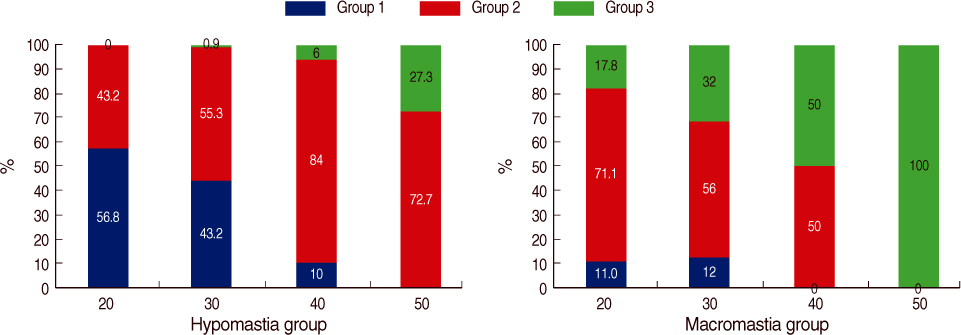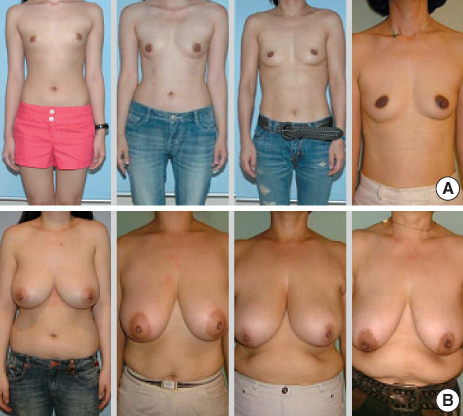J Breast Cancer.
2008 Mar;11(1):45-48. 10.4048/jbc.2008.11.1.45.
Comparison of the Body Mass Index of Women with Hypo- and Macro-mastia-MDbP303
- Affiliations
-
- 1M.D. Clinic, Seoul, Korea. dahl65@hanmail.net
- KMID: 2175048
- DOI: http://doi.org/10.4048/jbc.2008.11.1.45
Abstract
-
PURPOSE: This study was conducted to determine if the body shape of women with small breasts differed from that of women with large breasts.
METHODS
Between January 2002 and June 2006, 461 patients with hypomastia and 104 patients with macromastia, who had visited the M.D. Clinic, Seoul, Korea, were evaluated. These two groups were further divided into three groups (Group 1; underweight BMI<18.5, Group 2; normal BMI 18.5-22.9, Group 3; overweight BMI> or =23) according to Body mass index (BMI).
RESULTS
The average age of women with hypomastia and macromastia was 32 and 34.5 respectively. The average BMI was 18.88 in the hypomastia group and 22.19 in the macromastia group (p<0.001). In the hypomastia group, the distribution of BMI was as follows: group 1, 44.5% (n=205); group 2, 53.8% (n=248); group 3, 1.7% (n=8). However, in the macromastia group, a higher proportion of overweight individuals were observed, as shown by the following distribution pattern: group 1, 7.7% (n=8); group 2, 71.1% (n=32); group 3, 27.3% (n=3). In the hypomastia group, the proportion of group 3 were 0% in their 20s, 0.9% (n=2) in their 30s, 6% (n=3) in their 40s and 27.3% (n=3) in their 50s, but in the macromastia group, the proportion of group 3 were 17.8% (n=8) in 20s, 32% (n=8) in 30s, 50% (n=12) in 40s and 100% (n=10) in 50s.
CONCLUSION
The BMI of women with macromastia was significantly higher than that of women with hypomastia. In addition, although BMI was found to increase as age advanced for both groups, women with macromastia appear to have a strong tendency to become overweight with age.
Keyword
Figure
Reference
-
1. Spear S. Aston S.J, Beasley R.W, Thorne C.H.M, editors. Reduction mammaplasty and mastopexy. Grabb and Smith's Plastic Surgery. 1997. 5th Ed. Philadelphia: Lippincott-Raven.2. Brown DM, Young VL. Reduction mammaplasty for macromastia. Aesthetic Plast Surg. 1993. 17:211–213.3. Murtaugh MA, Herrick JS, Sweeney C, Baumgartner KB, Guiliano AR, Byers T, et al. Diet composition and risk of overweight and obesity in women living in the southwestern United States. J Am Diet Assoc. 2007. 107:1311–1321.
Article4. Cruz-Korchin N, Korchin L, Gonzalez-Keelan C, Climent C, Morales I. Macromastia: how much of it is fat. Plast Reconstr Surg. 2002. 109:64–68.5. Blomqvist L, Eriksson A, Brandberg Y. Reduction mammaplasty provides long-term improvement in health status and quality of life. Plast Reconstr Surg. 2000. 106:991–997.
Article6. Bruhlmann Y, Tschopp H. Breast reduction improves symptoms of macromastia and has a long-lasting effect. Ann Plast Surg. 1998. 41:240–245.
Article7. Collins ED, Kerrigan CL, Kim M, Lowery JC, Striplin DT, Cunningham B, et al. The effectiveness of surgical and nonsurgical interventions in relieving the symptoms of macromastia. Plast Reconstr Surg. 2002. 109:1556–1566.
Article8. Brown TP, Ringrose C, Hyland RE, Cole AA, Brotherston TM. A method of assessing female breast morphometry and its clinical application. Br J Plast Surg. 1999. 52:355–359.
Article9. Findikcioglu K, Findikcioglu F, Ozmen S, Guclu T. The impact of breast size on the vertebral column: a radiologic study. Aesth Plast Surg. 2007. 31:23–27.
Article10. Schnur PL, Schnur DP, Petty PM, Hanson TJ. Reduction mammaplasty: an outcome study. Plast Reconstr Surg. 1997. 100:875–883.
Article11. Lee SD. Reduction mammoplasty is a functional operation for improving the quality of life in symptomatic women-MDbP301. J Br Can. 2005. 8:89–93.
Article12. Platt AJ, Mohan D, Baguley P. The effect of body mass index and wound irrigation on outcome after bilateral breast reduction. Ann Plast Surg. 2003. 51:552–555.
Article13. Zubowski R, Zins JE, Foray-Kaplon A, Yetman RJ, Lucal AR, Papay FA, et al. Relationship of obesity and specimen weight to complications in reduction mammaplasty. Plast Reconstr Surg. 2000. 106:998–1003.
Article
- Full Text Links
- Actions
-
Cited
- CITED
-
- Close
- Share
- Similar articles
-
- Difference of the Obesity Index, Blood Pressure and Serum Lipids in Abdominal and Non Abdominal in Men and Women
- Correlation Among Waist to Hip Ratio, Body Fat, BMI, Weight and Serum Lipids in Obese College Women
- Correlation between Women's Body Mass Index, Daily Habits and Acne Severity
- Relationships between Obesity, Body Image Perception, and Weight Control in Adult Women
- Association of cesarean delivery with increases in maternal body mass index



